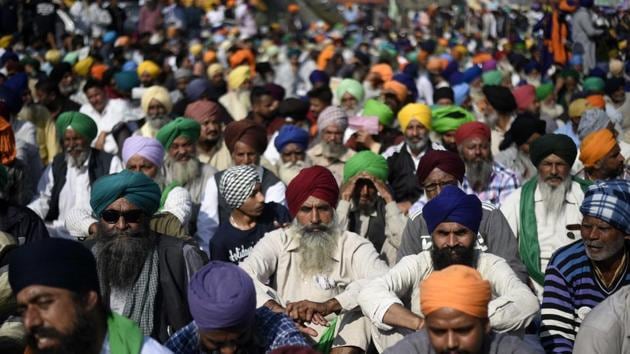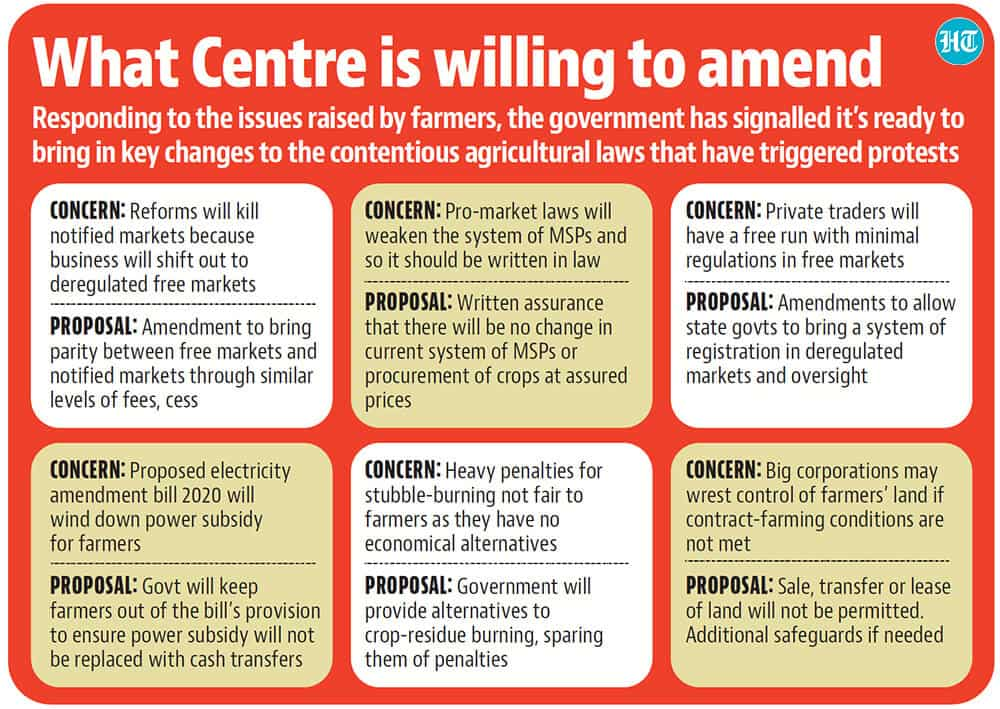Farmers’ protest: Govt offers broad concessions, farmers adamant
Farm unions on Wednesday vowed to scale up protests by December 14 by blocking all highways into New Delhi and occupying toll plazas in large numbers
The Union government offered broad concessions to farmers, proposing to amend two farm-reform laws and a bill pending in Parliament in a bid to end weeks of protests, but farm unions stuck to their demand of scrapping the three pro-market legislations they say will hurt their livelihoods. With negotiations locked in an impasse, a long battle looms. Farm unions on Wednesday vowed to scale up protests by December 14 by blocking all highways into New Delhi and occupying toll plazas in large numbers.


The government has deregulated farm markets, giving more space to private traders, to spur investments in a farm sector dependent on subsidies. Farmers have opposed the new changes, saying they will be swallowed up by big corporations. On Wednesday, the government appeared to address most of the farmers’ concerns. It offered in writing concessions it was willing to make. It proposed giving states greater role in so-called free markets, and a written assurance to continue the system of minimum support prices (MSP), which offers farmers state-set assured prices for staples. Another key offer is to bring additional legal safeguards for farmers’ rights engaging in contract farming “if needed”, including a bar on any confiscation of farm land to recover dues, and possible immunity to farmers from penalties for crop-residue burning, which causes pollution.
In the letter signed by Vivek Aggarwal, joint secretary in the agriculture ministry, the government said it would make a clutch of amendments to the laws to make farmers more confident of facing the markets. But the farmer unions — which cancelled Wednesday’s scheduled talks after an informal meeting with home minister Amit Shah on Tuesday could not break the deadlock — remained adamant.
“These proposals do not address most of our concerns.
Despite rejecting the government’s offer of amendments, it has rehashed the same proposals. It is only trying to wear farmers out,” said Kirankumar Vissa of Rythu Swarajya Vedika, a farmer representative.
Together, the laws allow businesses to freely trade farm produce outside the so-called government-controlled “mandi system”, permit private traders to stockpile large quantities of essential commodities for future sales and lay down new contract-farming rules.
The government’s first proposal is to amend The Farmers’ Produce Trade and Commerce (Promotion and Facilitation) Act, 2020 to bring parity between so-called free markets and notified markets controlled by state governments.
“Amendments will be brought to allow states to introduce a system of registration in private markets and also allow states to levy cess and service charges equivalent to those applicable in notified markets,” the first proposal states.
Farm unions contend that government-controlled regulated markets, which levy trade fees, will collapse due to competition from new deregulated free markets, which have no fees or charges. Farmers have overwhelming back the existing network of regulated markets because they give them assured prices for staples. Many economists say middlemen often rig prices in these oligopolistic markets to their advantage.
A related proposed also said states could make their own rules on mandatory documents that traders need to operate in free markets, doing with the provision for minimal documents.
The new laws make local magistrates the final authority to settle disputes between traders and farmers. Farm unions have opposed this provision. The government’s proposal on this said “amendments will be made to allow farmers to approach civil courts of their choice”.
The government also said it would amend The Farmers (Empowerment and Protection) Agreement on Price Assurance and Farm Services Act, 2020 to bring additional safeguards to secure farmers’ right over his land “if needed”.
“The contract-farming law already prohibits transfer, sale, lease, mortgage of a farmer’s land. Agribusinesses (sponsors) cannot confiscate farmers’ land due to any reason arising out of contractual farming. If needed, a fresh clarification on this will be issued,” the government stated. A written assurance on continuation of the existing MSP system is another proposal.
Farmers have opposed penalties on pollution-causing crop-stubble burning, invoked through an ordinance in October. “The government will come up with a solution to this issue,” the proposal stated, with elaborating.
Lastly, the government said it would keep farmers out of the Electricity (Amendment) Bill, 2020. Farmers have opposed a key provision of the bill, which provides for a direct-cash-transfer mechanism for transferring power subsidy to eligible consumers, including farmers, a major recipient of subsidised power.
Farm unions say they are prepared to dig in for months in what has become a politically challenging spiral of farmers’ protests in decades.
“The issue is not about any one clause but the direction in which the government is pushing farming in India, one that is presaged on large corporations, against the interests of farmers and consumers. If the government is ready for so many amendments, why can’t it just repeal the laws and end the matter,” said Kavitha Kuruganti, the lone woman negotiator representing farmers at the recent rounds of talks with the government.
Experts called for a need to work out a solution.
“Agriculture broadly needs a combination of reforms, investments, support prices, and subsidies. Emphasis on one form of solution over others will not help. Both sides should work out a solution which ensures all these go hand in hand,” said economist K Mani, a retired professor at the Tamil Nadu Agricultural University.
“This is the first time the Narendra Modi government is facing sustained opposition at the ground level. It is difficult to say how exactly it will impact it politically. The question is whether farmers are a homogenous class. Voting is India is not known to be class-based. A farmer doesn’t vote as a farmer. Rather, other identities take over,” said KK Kailash, who teaches political science at the University of Hyderabad.
Get Current Updates on India News, Ram Navami Live Updates , Lok Sabha Election 2024 live, Elections 2024, Election 2024 Date along with Latest News and Top Headlines from India and around the world.




